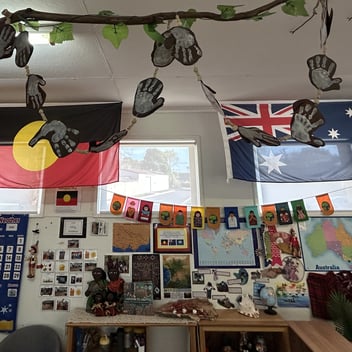For educators, attending professional development is an important part of their professional growth. Educators get to listen to lots of wonderful thinking and ideas, but sometimes they can be unsure how best to incorporate them into their program. This can be especially true with maths.
ECMS Practice Coach Melissa Dann and Early Childhood Teacher Rebecca Waingold from The Merrell Kindergarten presented at the Melbourne Mathematics Conference, a collaboration between the Mathematical Association of Victoria and the Faculty of Education at University of Melbourne. Melissa and Rebecca delivered a hands-on interactive session titled “More Than Numbers”.
The aim of this approach is to create a learning environment where every child can confidently navigate mathematical experiences with proficiency and joy. The approach incorporates everyday objects around the children and integrates maths learning into their daily activities in a way that is achievable and meets the needs of individual children, as Rebecca explains:
“We know how important it is for children to have a foundation of good maths learning. Because of this, we look for opportunities throughout the day to incorporate maths activities.”
One of these activities involved Rebecca using an inflatable dice during group time. Rebecca threw the dice in the air and the children had to call out the number that landed. When children do this, they are practising ‘subitising’, the ability to know the number without having to count. By using this playful approach, the children are practicing foundational maths concepts while feeling that they are participating in a game.
This teaching approach intentionally uses maths language wherever possible, while encouraging different maths investigations in play. Rebecca also looks for opportunities to incorporate maths into everyday kinder routines. It might be related to the day’s activity: how many spades would they need today in the sandpit? If there are six bikes out today, how many helmets would they need? Or counting the lettuces they’ve planted in the veggie patch.
Melissa Dann goes deeper into the teaching and learning. What seems incidental is actually intentional:
“When the children bring you the treasures they're found in the garden and you respond: ‘Look at that! We’ve got three rocks and two leaves - how many have we got all together? We’ve got five!’ - we're going from surface learning to deep learning, that’s our aim.“
“Surface learning is rote counting, deep learning is saying ‘can you show me five?’ They might show you three and two. ‘Can you show me five in a different way?’ One and four.
“It’s that really deep thinking and understanding we’re aiming for. Through maths activities, children are able to ask questions, and can explain their mathematical thinking. Through this they have the opportunity to develop critical thinking and problem solving skills.
“Through intentional maths teaching children build mathematical proficiency so that they see themselves as confident and capable maths learners.”
“We know that children are more motivated to learn and get involved in an activity when they feel happy, relaxed, and connected to others.
“Rebecca finds that doing these activities in a small group allows her to track individual children’s progress because every child gets to have a turn to participate and to be heard.”
This is a teaching approach that supports children where they are in their individual learning journey. It takes a long time with lots of opportunities to practice for children to become proficient.
“For example, we're not spending time teaching the children to rote count to 20 when they're still learning to count and understand a collection of five.”
Where children are can vary greatly. At The Merrell, Rebecca had a lovely example of one child who really understood wider concepts:
“We made a bar graph using Duplo. The children were graphing their favourite ice-creams, adding up the blocks as each child put their preference forward. About halfway through, one child commented ‘Oh I get it. We’re getting ice-cream information!’”
“At the very end the child said ‘If I change my mind and move my block, does that mean I'm changing the data?’ That is so clever! you’ve got a child of four who knows how to manipulate data!
“That's telling you a lot about that child's ability to think, and to really think deeply. That level of understanding is like a ‘wow.’ So we know that data discussions in kindergarten work. For some children, it's just going to be ‘There's more people that like chocolate’ because you can count that eight children like chocolate and four like vanilla or strawberry, because they’ve got that Duplo graph to refer to. But for him, it was actually that step further - really deep understanding of the process of gathering and graphing data, and the understanding that he can manipulate it.”
At the Melbourne Mathematics Conference, Melissa and Rebecca’s expertise and relatable, everyday examples helped to make this purposeful, rich teaching approach achievable and fun. They did this by involving their audience in some simple hands-on activities, making the teaching of such concepts as subitising and data easy to understand in practice.
Just like they do, every day, with every child.

%20cropped.jpg?width=352&name=ECM_SHOOT1_LOWRES_@MAXROUX-1%20St%20Marys%200324%20(108)%20cropped.jpg)

